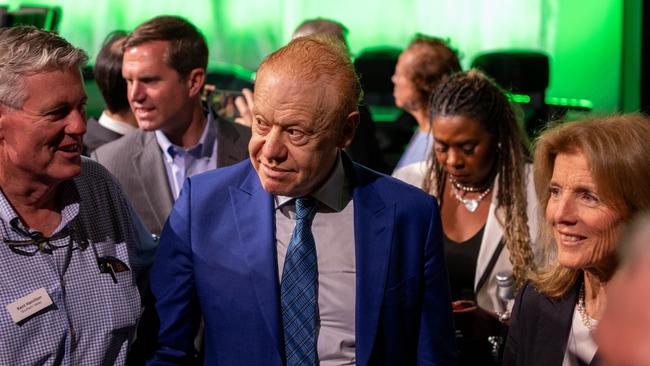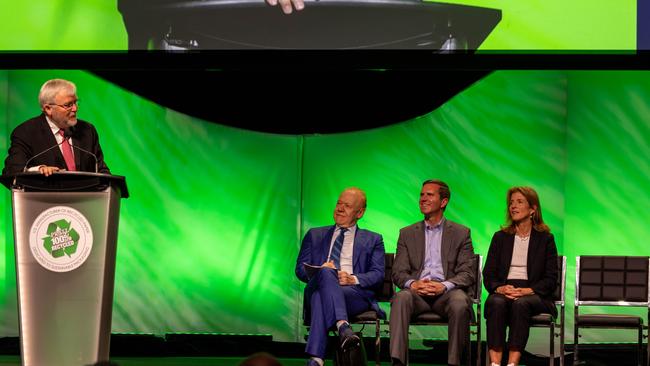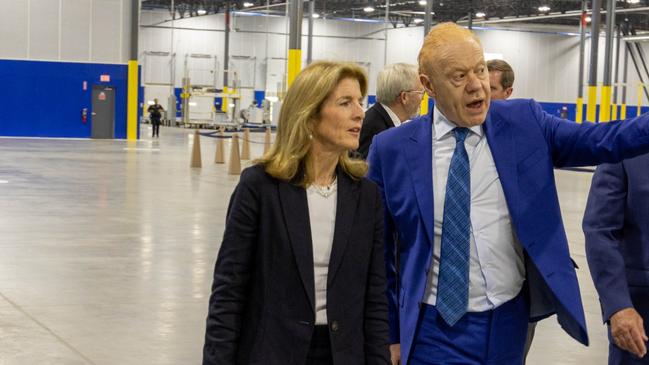Anthony Pratt opens state-of-the-art paper mill in America
In typical flamboyant fashion, manufacturing and recycling billionaire Anthony Pratt has opened his $1bn paper mill in middle America.

There was enough Kentucky Fried Chicken to feed 750 guests who gathered in Middle America to celebrate an Australian billionaire’s biggest achievement yet, capped off with a stirring rendition of “My Old Kentucky Home” by bluegrass legend Dan Tyminski of Soggy Bottom Boys fame.
In what was a typical flamboyant celebration, cardboard box manufacturing and recycling billionaire Anthony Pratt opened his biggest ever paper mill in America: a $US700m ($1.09bn) state-of-the-art facility in Kentucky that he says encapsulates the comeback of regional American manufacturing under President Joe Biden.
Henderson is a small town of fewer than 30,000 residents but is one Pratt believes represents a crucial milestone for his Pratt Industries in the US — and shows how President Biden’s Inflation Reduction Act has changed the game for towns like Henderson in spurring investors to accelerate spending on green manufacturing and other measures such as promoting green energy.
The new Pratt Industries factory — the sixth of the last eight paper mills in the US built by the Australian billionaire — will produce 1500 tons of 100 per cent recycled paper every day, to be then made into cardboard boxes at nearby Pratt plants.

“We are in the middle of the two biggest trends in America right now, which is sustainability and the renaissance of regional manufacturing here,” Pratt tells The Weekend Australian.
With a population just shy of 30,000, Henderson is a working-class town that sits on the Ohio River, flanked by bigger cities such as St Louis, Indianapolis, Cincinnati and Nashville.
There’s hiking trails nearby, wineries, a museum dedicated to naturalist James John Audubon and the Ellis Park thoroughbred racetrack.
It also now has a Pratt Industries paper mill the size of two American football fields, which Pratt claims is the most technologically advanced and environmentally friendly facility of its type ever built. He says it will save the equivalent of 25,000 trees every day — more than in New York’s Central Park.
Pratt opened the new facility in a ceremony overnight (on Friday morning Australian time).
Guests who feasted on fried chicken, ate grits and brisket while listening to bluegrass included US Ambassador Kevin Rudd, the US ambassador to Australia Caroline Kennedy, Kentucky governor Andy Beshear and Lonnie Ali, the wife of the late boxing great Muhammad Ali.
Pratt has been particularly focused on promoting his company’s environmental credentials, saying it is “in the landfill reduction business” given it recycles all its paper, which is “good for greenhouse gas reduction because as things decay in the landfill, they produce methane gas which is 84 times worse for climate change than carbon dioxide. So recycling is an important weapon against climate change.”
President Biden’s green friendly policies therefore are “right in our wheelhouse” according to Pratt, who labels him “on sustainability, probably the best President for 30 years since we have been here”.
Pratt Industries now has manufacturing facilities in 25 states across America, dotted in small towns like Henderson, in states such as Indiana, Ohio, Texas, California, Pennsylvania, Georgia and elsewhere.

It is these sorts of towns, Pratt says, where the “core-out of American manufacturing” took place, as factories closed down and operations were offshored to cheaper places to do business such as China.
But he says Biden’s policies are helping reverse the trend. The President himself has been keen to promote his manufacturing industry credentials.
“Folks — when I think climate, I think jobs,” Biden said last month, referring to cleaner energy production that has sparked a rise in construction spending on new factories.
White House climate adviser Ali Zaidi told reporters in August that “hundreds of actions co-ordinated through [Biden’s] entire government are sparking a manufacturing renaissance across the United States.”
Pratt says there is a great “onshoring going on” across America as manufacturing jobs and facilities return from China and other overseas countries.
“I think people are realising that what they saw in Covid was that there was a great need to have sovereign manufacturing. Secondly, there were a lot of supply chain bottlenecks. And thirdly, now we’ve got this whole what you might call geopolitical issue with [Chinese telco] Huawei and all that sort of stuff that has caused security concerns.”
The Kentucky factory is part of Pratt’s $US5bn spending pledge in the US over the next decade. He is planning to invest the money in American recycling and clean energy infrastructure to create more than 5000 manufacturing jobs in 10 years.
That includes at least two, potentially three, huge mills like the one in Kentucky over that time, though Pratt says it would be difficult to accelerate his current timeline of building one every four years.
“It takes four years to get a degree at university, so I think the timing makes sense. We’re in a very capital intensive industry and we’re a private company. So I would like to keep it to about four years per mill.
“You have to remember that every mill is usually surrounded by 12 box factories under our hub and spoke model [where the mills make paper for the nearby factories] so that is like building 13 factories in a way. That is building one every quarter, which is a lot. But the great thing about America is in this market, steady growth is forever.”
Pratt Industries and its Australian sister company Visy (Pratt owns all of the former and shares ownership of the latter with sisters Heloise Pratt and Fiona Geminder) have combined annual revenue of $10bn — of which the US business accounts for about $6bn.
Pratt Industries is the fifth biggest box maker in America, having worked its way up from being the 57th largest when Pratt was sent to the US by his late father Richard three decades ago to look after its ageing paper mill in hardscrabble Macon, Georgia.
The company now has market share of about 8 per cent, has invested $12bn in America over its history and has 12,000 employees — making it the biggest Australian-owned employer in America.
Pratt is ambitious for his company to keep getting bigger. It boomed during Covid, when people stuck at home ordered more goods that were delivered in cardboard boxes, and after a drop in demand as lockdowns ended, Pratt says he has noticed a recent bounce-back in revenue
“We’re still a relatively small percentage of the market in America. And so we’d like that because it means there’s been a lot of room to grow.
“We went through a bit of a lull after Covid ended. Before then people were ordering a hell of a lot online, and that made us go through the roof. Then all of a sudden people went back to work and shopping at supermarkets again, and there was less ordering online.
“But in the last few months, it has kicked back up for us again. We’re not sure of the reasons just yet, but we have definitely noticed a surge in activity.”
The author travelled with Pratt Industries.




To join the conversation, please log in. Don't have an account? Register
Join the conversation, you are commenting as Logout